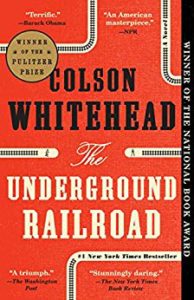I recently finished reading The Underground Railroad by Colson Whitehead. It was a book that looked good to me for quite a while, and when I noticed it was available on audiobook at the library, I had to check it out. For the most part, I thought it was an enjoyable book; however, there were a few things about the book that detracted from the book (for me).
Cora is a young lady that grew up as a slave. When the plantation she lives on changes hands, she agrees to run away with Caesar, another slave. Along the way, they meet hazards, including slave catchers and even the people that are trying to help them.
What I Liked
The Underground Railroad uses a clever metaphor: the Underground Railroad in this story is an actual railroad. Literal trains take our protagonists to their new locations. It was a clever way to fictionalize the story.
I liked the characters, the tension, and the plot to this story. Cora and Caesar are being chased by a slave catcher, Ridgeway, who is irrationally fixated on them. The book also does a good job at portraying the horrors of slavery, as well as the awful things done to black people throughout history.
What I Didn’t Like
Although I liked the story overall, The Underground Railroad played very loose with history. If there was a time when North Carolina decided to kick all the black people out of the state, I have yet to hear about it. Did South Carolina set up clinics to take care of black people and provide them with free medical care? I don’t think so. While I was fine with the railroad analogy, I find it unbelievable that an ex-slave would have even considered staying in the slaveholding South.
Additionally, there were scenes that were unnecessary and/or confusing. When Cora changed her name, I originally thought it was a new character. There was a chapter about a gravedigger and I have no clue why it was put there. I felt the last chapter about Caesar was unnecessary. Maybe because the story was a little over 300 pages and the author thought the story would be too short without them? I would have rather had more scenes that were central to the story.
Overall
Despite the fact that my section on what I didn’t like was longer than my section on what I did like, I was entertained by the story and gave it four stars on Goodreads. I liked Cora and rooted for her freedom. The Underground Railroad could have been better, in my opinion, but that doesn’t mean that it isn’t worth reading. I recommend it, as long as you’re not looking for a historical book that actually follows historical facts.

I thought the actual railroad was an interesting concept too, so unique. I enjoyed this when I read it but had some of the same issues you had, especially about there being unnecessary chapters that could have been removed.
🙂 I’m not sure why it won so many awards, having those issues. Maybe because so few books address the issue?
I am both intrigued and annoyed – I love history and struggle with books that play it fast and loose with facts – especially something so obviously untrue as those you mentioned in the Carolinas. I am glad you were still able to enjoy this one even with those serious errors.
I love history too. I didn’t mind the trains because it was obviously made up (to anybody that knows anything about the actual Underground Railroad), but the author mixed in some real facts (like the syphilis experiments) with fabrications, and it’s hard to know what is real and what isn’t.
One of the things that I’ve been really impressed with about Cassandra Clare’s books (other than how the worldbuilding is so well-thought out) is that when she does put in a historical fact in her books, you can usually google it and find out that it actually happened.
Yes, the trains aspect would not bother me because there’s a literal purpose there. But the other things you mentioned would have worked a nerve. I have a much better time reading historical fiction when I know the author has done extensive research, and then even goes so far as to explain their decisions in the notes, share their research, and point readers to more materials. Not many do that though, which is a bummer.